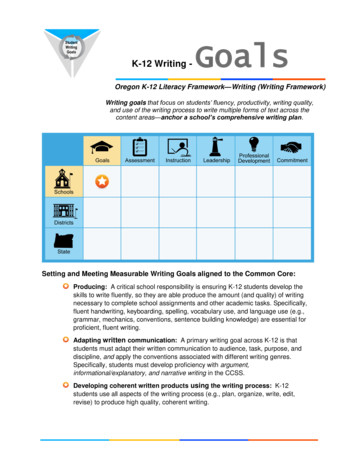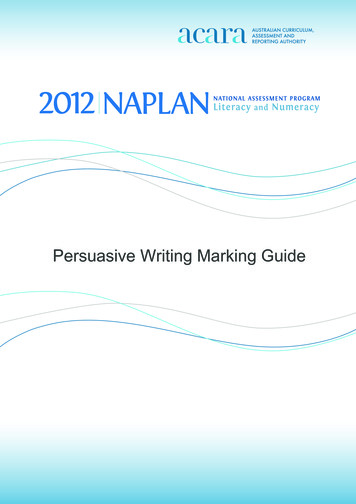A Guide To Writing A Senior Thesis In Sociology
A Guide to Writinga Senior Thesis in SociologyDepartment of SociologyFaculty of Arts and SciencesHarvard UniversityA Guide to Writing a Senior Thesis in Sociology page 1
page 2
A Guide to Writinga Senior Thesis in Sociology
Cover art: Genevieve ButlerCopyright 2009, President and Fellows of Harvard College
Table of ContentsTime Management and Sample Timeline. 1Part Five: Drafting the Thesis. 40Overview. 40Part One: Before You Begin. . . 3Choosing to Write a Thesis. 3The First Steps: Choosing a Topic and an Adviser. 4Turning a Topic into a Research Question. 8Choosing a Methodology:How Will I Answer My Question?. 13Introduction. 41Literature Review: Setting Up Your Thesis. 42Data and Methods. 43Results. 45Discussion and Conclusion. 51Basic Writing Tips. 52Revision, Revision, Revision. 54Part Two: Preparing Your Research. 18Beginning the Literature Review. 18Part Six: Turning in the Thesis. 56Developing and Testing Your Methodology. 21Formatting. 56Choosing Your Sample. 23Grading. 58Writing the Prospectus. 28Part Three: Collecting Your Data. 30Appendix One:Abbreviated Version of the ASA Style Guide. 59Recruiting Subjects or Gathering Data Sources. 30Administering Your Instrument. 32Data Management:Administrative Responsibilities during Data Collection. 34Part Four: Analyzing Your Data. 36Qualitative Data Analysis Basics. 36Quantitative Data Analysis Basics. 37Content Analysis Basics. 38Appendix Two:Funding Sources for Thesis Writers. 62End Matter. 63
Time Management andSample TimelineOne of the most difficult parts of conducting original research is scheduling yourtime. Too many people leave the writing to the last minute, leave no time for revisions, and consequently produce a thesis that falls well below its—and their—potential.Others leave their advisers in the dark until shortly before the thesis is due and then getstuck when the adviser asks for changes and time runs out. Here are some tips for timemanagement: Plan ahead: Work backwards from the thesis due date and block out time for each step in theprocess. In general, you will need a month or so for revisions, polishing, and final typing, and youradviser will need ample time to look over a completed draft before you revise it. Therefore, youought to have a complete draft to your adviser five or six weeks prior to the deadline, whichmeans early February. This means that you ought to be writing by early January, which meansthat the research ought to be more or less complete by early January. Start writing early: Work on the introduction and literature review drafts before collecting data,and write the methods chapter as you design your instruments. The final version will likely lookvery different as you continue to revise and focus the thesis, but working on drafts is easier thanstaring at a blank screen! Meet regularly with your adviser: Consult with your adviser on a schedule and keep him/herregularly informed of how things are going. Do not leave consultations to the last few weeks: asyour thinking changes, as your work progresses, as your findings begin to become clear, keep youradviser up to date on what is happening. Communicate! Allow time for your adviser to read your work: Remember, advising is a two-way street; itrequires an effort on the part of both of you if it is to be maximally beneficial to the thesis. You areprobably immensely busy; so is your adviser! Keep that in mind. Make some progress every week: A completed thesis looks immense. By breaking it into shorter writing projects, it becomes less imposing, more like the shorter papers that you’re used towriting.A Guide to Writing a Senior Thesis in Sociology page 1
Schedule for Junior Spring and Senior YearChoose to Write a Thesis!Spring of your junior yearDevelop Research QuestionSpring of your junior year*Statement of Intent and Adviser SelectedLast day of spring reading period, junior yearRead and Research for Lit ReviewJune and JulyDesign InstrumentsJune and JulyTest InstrumentsAugustData CollectionSeptember-December*Prospectus and Completed Approval FormFriday before 5th Monday (Add/Drop Deadline) fall term, senior yearWrite Intro and Literature ReviewOctober-NovemberInitial Data AnalysisDecember-early January*Progress ReportLast Friday of fall reading period, senior yearFinal Exam PeriodMid-DecemberWrite Methods ChapterDecember-JanuaryWrite Results ChaptersJanuaryRevise Intro and Literature ReviewJanuary-FebruaryWrite Discussion and ConclusionEarly FebruaryRevise Results ChaptersEarly FebruaryComplete Draft to AdviserMid FebruaryIncorporate Adviser FeedbackLate FebruaryFinal Draft to AdviserLast week of FebruaryIncorporate Adviser Feedback and proofreadEarly March (week before due date)*Thesis Due DateTuesday before spring recess, senior year*For these major deadlines, view "Schedule of Thesis Deadlines" on the department r thesis.html.This sample timeline assumes that the adviser can turn around a draft in two to three weeks, which may or may notbe the case for your adviser. It also assumes the student will do some work on the thesis over the summer. Althoughthis is not required, we find the strongest theses do begin in the summer.Departmental deadlines are in bold.Keep in mind that you will be taking courses during this time and plan accordingly!page 2 Sample Timeline
Before You Begin. . .Choosing to Write a ThesisA senior thesis is an original research project undertaken during one’s senior year atHarvard College. The thesis project requires research into the theories and past researchrelevant to the project, analysis of data, either original or existing, and a written finalproduct. The thesis should be a project that can be feasibly completed in 7-10 months.Generally, a thesis is about 60 to 100 pages, but there is no minimum or maximum.Senior Sociology concentrators are not required to write a thesis. A thesis is requiredfor those students who wish to graduate with honors in Sociology.Why Should I Write A Senior Thesis?The decision to write a thesis should be taken seriously. You should consider whatbenefits you personally will get from the process. About half of Sociology concentratorschoose to write a thesis; writing a thesis is not the best plan for everyone.Good Reasons to Write a Thesis Intellectual excitement about an idea and the desire for an intense academic experiencethat caps off your academic program. The thesis is a “capstone” experience that allows you agreat deal of freedom to explore a topic you care about and to build an area of expertise and wisdom. You can spend a whole academic year answering a question you think is important and intriguing. You have the opportunity to make an original contribution to knowledge. Many studentsreport that writing a thesis is the most intrinsically satisfying part of their college experience.part oneWhat is a Sociology Senior Thesis? Close contact with a faculty member. You and your thesis adviser will meet often (ideallyweekly or semi-weekly) for an entire academic year. You and your adviser will get to know eachother well and will develop a strong mutual interest in the outcome of your thesis. The undividedattention of your adviser and your working relationship with him or her can be one of your bestlearning experiences. Career preparation. If you are considering graduate school in sociology or the social sciences,humanities, or even the sciences, we encourage you to write a thesis. The experience of writing athesis is the closest you can come as an undergraduate to understanding what advanced graduate study will look like. Writing a thesis provides you with the opportunity to test and hone yourskills as an independent researcher—and to make sure that you like the process of independentresearch! It is a good way to gain some self knowledge. If you do not like key aspects of writingyour thesis (independent research, the writing process, intellectual debate and stimulation) youwill likely not enjoy writing a dissertation. Alternatively, many people who had not consideredgraduate school found the thesis writing process so appealing they changed their future plans.A Guide to Writing a Senior Thesis in Sociology page 3
Thesis writing is great preparation for non-graduate schools careers as well—gathering information, analyzing it, and writing to persuade a reader are tasks that every professional will value.Bad Reasons to Write a Thesis Graduating with honors. If the only reason you want to write a thesis is to graduate with honors,it is unlikely you will have a positive experience. The thesis requires deep and persistent engagement with a topic, and unless you have a genuine interest in that topic, the process will not beintrinsically rewarding (and will probably be quite painful!). Because you think you should or someone else (parents, block mates, friends, etc) thinksthat you should. Do not worry about writing a thesis because it seems like everyone else is doing it.The real question is whether you have a topic or question you care about and the commitment anddesire to really devote yourself to the thesis. Impressing others or living up to some idea of what yoursenior year should be is a shallow reason to write a thesis, and you will probably regret it.If undertaken for the rightreasons, writing a thesiscan be an immenselyrewarding experience.Be sure that you havea genuine interest inanswering a question thatis important to you beforeyou begin.If undertaken for the right reasons, writing a thesis can be an immensely rewardingexperience. Be sure that you have a genuine interest in answering a question that isimportant to you before you begin.Writing a thesis is not right for everyone. Some students do not have the time tocommit to the process due to team or activity commitments, coursework requirements,or because they anticipate having to spend time sitting for job interviews in the falland spring. However, many students are still interested in doing independent researchand working closely with a faculty member. For these students, we encourage takingSociology 91r, an independent reading and research course, with a Sociology facultymember. This is a one semester course resulting in a smaller research paper, but it givesyou the experience of independent work and provides an alternative way to tie togetherwhat you have learned as a Sociology concentrator.The First Steps: Choosing a Topic and an AdviserOnce you’ve decided to take the plunge and write a senior thesis, there are two keychoices you must make: choosing a topic and choosing an adviser.Choosing a TopicHopefully, you have already thought about a research topic that interests you beforedeciding to write a senior thesis. A research topic can be very broad—you have not yetdeveloped a specific research question, but instead have an expansive area of interest.Here are some tips for choosing a successful thesis topic: Let your interests guide you. This project will consume much of your senior year, so pick a topicthat you are genuinely interested in and committed to exploring. Think about interesting topics orreadings from your coursework—what caught your attention? Pay attention to your social world. Look to the media, news outlets, your friends, Cambridge,and Boston—what issues are people debating now? What questions need answering? Think of your volunteer/civic engagements in a new way. Many Harvard students are activein causes that matter to them. Is there a sociological question inspired by the volunteer work youpage 4 Before You Begin. . .
are doing? Maybe you volunteer in an education program for underprivileged children and youhear conversations about school readiness at home. This experience could turn into a senior thesisabout differences in how parents from different racial/ethnic backgrounds prepare their childrenfor kindergarten. Combining your personal and academic interests ensures you will stay engagedwith your topic. Revisit classical theoretical issues. Think back to the founding theorists you read about in Sociology 97. Do Marx, Weber, Durkheim, Simmel, etc. put forth a proposition that you’d like to testwith empirical data? Think of this as a chance to do something totally new. Is there a course you wish the department offered about a certain topic? What research questions follow from that topic? Engage with current or past research—see what has been done. The American Journal ofSociology and American Sociological Review are the top journals in the discipline. What topicshave they covered recently? What can you add to the debate? The American Sociological Associationalso publishes a journal called Contexts with shorter magazine-style articles about “hot topics.”Again, your research topic does not have to be specific yet. In the next section, wediscuss moving from topic to research question. Do some brainstorming—write down5 to 10 topics that interest you. Talk with friends, professors, and teaching fellows to seewhich topics are the most interesting (and could provide the starting point for a strongthesis). Once you have decided on a topic, you are ready for the next step.Thesis Tip: Keeping a Project JournalIn the “hard” sciences, lab researchers and technicians keep laboratory notebooks,where they write down progress for each day. Similarly, you should keep a thesisjournal—sociology is a science!Devote a notebook or an electronic file to your thesis. Every time you work on yourthesis, note the date and the problem you are pursuing that day. Start at the verybeginning of the process with brainstorming topics and keep writing in the journalup until the end. You should record what you are doing and why at each stage of theprocess. This record will prove helpful when you are working on data collection andanalysis if you forget why you made a decision, or if you don’t work on your thesisfor a week or so during midterms and can’t remember what you were working onlast.Keep good notes at each stage of the thesis writing process and you will find thatwriting the actual thesis becomes much easier—you’ve already started!Choosing an AdviserOnce you’ve identified the broad subject area you are interested in exploring, youshould think about who to choose as an adviser.A Guide to Writing a Senior Thesis in Sociology page 5
All senior thesis writers will be supervised by an adviser. S/he will work closely withyou throughout the thesis process. Generally, the adviser is the “final word” on yourthesis in terms of approving your topic, methods, and the final product and is involvedin reading drafts and meeting with you frequently. You should talk with your adviserto be clear about what you expect from them and what they understand their responsibilities to be.Faculty members in the Department of Sociology may serve as an adviser. Advancedgraduate students in the PhD programs in Sociology, Social Policy, and OrganizationalBehavior, as well as faculty in other departments, professional schools, or research institutes at Harvard, may also serve as a thesis adviser subject to the approval of the Directorof Undergraduate Studies (DUS) or the Assistant Director of Undergraduate Studies(ADUS). A list of advanced graduate students eligible to serve as senior thesis advisersis available on the department website and/or can be obtained from the UndergraduateOffice.You should talk withyour adviser to be clearabout what you expectfrom them and whatthey understand theirresponsibilities to be.There are several ways to go about choosing an adviser. One strategy is to considerprofessors in whose courses you have been or are enrolled. Is your thesis topic relevant to their research interests? A second strategy is to look on the Sociology department website (www.wjh.harvard.edu/soc) for a listing of faculty members and theirresearch interests and ongoing projects. You can also think about interesting articlesor books you’ve read in your coursework—our department boasts many of the mostprominent scholars in the field, and it’s possible that one of the authors that inspiredyour topic is here! Finally, you can meet with the ADUS to brainstorm about who asuitable adviser might be. They may point you to new or visiting faculty of whom youare otherwise unaware.You should consider several criteria when choosing an adviser. First, your advisershould be interested in your topic. This does not mean that they must be an expert onyour topic; the adviser’s guidance in terms of sociological thinking and research is oftenmore important than their substantive guidance. Ideally you will become the experton your topic as you go through the thesis writing process. But the adviser should atleast find your topic interesting enough to ensure their continued involvement. Youshould also think about faculty members’ methodological expertise. It may be morehelpful that you have someone who does work similar to the kind you are interested in(ethnography, interviews, advanced statistical techniques, etc.) than to have someonewho can serve as a substantive expert. Second, you should also consider personal styles.You will be working with this person over the course of a year, and it’s important thatyou feel comfortable with them. Often a faculty member will advise a thesis outsidetheir area of specialization, so if you have a good working relationship with a facultymember, this can be more important than expertise. There are experts in nearly everyfield across our University, and sometimes meeting once or twice with an “expert” is allthe substantive input you need. It is as important to find an adviser who is supportiveand with whom you feel comfortable as to find an adviser who works in your area ofinterest.You can also learn more about potential graduate student advisers by visiting the Sociology department website for a listing of graduate students and their research interests.You should also think about teaching fellows you have had in past courses. Do you knowabout their interests? Do you get along well with them? Emailing a former TF is often agood starting point to learn more about graduate student interests. If they can’t personallypage 6 Before You Begin. . .
work with you, they often know a lot about what fellow graduate students are interestedin and who might be a good fit for your topic.Once you have identified a potential adviser, you must ask him or her to advise thethesis! This should take place during spring semester of your junior year. You will moveback and forth between choosing an adviser and finalizing your research question (seenext section). Before approaching advisers, do some brainstorming on your own. For
Sociology 91r, an independent reading and research course, with a Sociology faculty member. This is a one semester course resulting in a smaller research paper, but it gives you the experience of independent work and provides an alternative way to tie together what you have learned as a Sociology concentrator.
work/products (Beading, Candles, Carving, Food Products, Soap, Weaving, etc.) ⃝I understand that if my work contains Indigenous visual representation that it is a reflection of the Indigenous culture of my native region. ⃝To the best of my knowledge, my work/products fall within Craft Council standards and expectations with respect to
Best Practice Book for IELTS Writing. Table of Contents IELTS Writing 1 IELTS Writing 9 IELTS Writing - Overview 9 IELTS Academic Writing 10 IELTS ACADEMIC WRITING 10 IELTS General Writing 11 IELTS Writing Task General (Task 1) 12 Sample 1 12 Sample 2 12 Sample 3 13 Sa
Academic Writing Quiz xvii Part 1 The Writing Process 1 1.1 Background to Writing 3 The purpose of academic writing 3 Common types of academic writing 4 The format of long and short writing tasks 4 The features of academic writing 6 Some other common text features 6 Simple and longer sentences 7 Writing in paragraphs 8 1.2 Reading: Finding .
(CCSS) for Writing, beginning in early elementary, will be able to meet grade-level writing goals, experience success throughout school as proficient writers, demonstrate proficiency in writing to earn an Oregon diploma, and be college and career-ready—without the need for writing remediation. The CCSS describe ―What‖ writing skills students need at each grade level and K-12 Writing .
Writing Spectrum is available in these titles for second grade success: Carson-Dellosa Publishing LLC P.O. Box 35665 Greensboro, NC 27425 USA carsondellosa.com SPECTRUM Writing GRADE 2 Focused Practice for Writing Mastery Writing a story Writing to inform Writing an opinion
Assessing Writing in the National Assessment Program The NAPLAN writing task The writing task for the 2012 writing assessment is a persuasive writing task. It is the same task for all students in Years 3, 5, 7 and 9. The writing task is provided to the students on a full-colour stimulus sheet. It contains the topic, task
This guide has seven chapters. Chapter 1 provides an overview of effective writing instruction. Subsequent chapters address the five key instructional approaches of an effective writing program: modelled writing, shared writing, interactive writing, guided writing, and independent writing
The process writing approach treats writing not as a completed product but as a process. Writing studies are carried out as a part of the process before the written text is completed. This approach focuses on the student in writing lessons, and the teacher only acts as a guide. The process writing approach involves activities occurring






















